Wear Better




















Diversity, inclusivity, transparency, concern for the planet and its people, care for our customers – this is our philosophy.
Created for consumers who want to make better, more conscious decisions without compromising on fashion. Since day one, our aim at NAGO has been to create a brand focused around the philosophy of sustainable development – the first of its kind in Poland. It has taken a great deal of dedication, resources, discussion and a commitment to implementing many innovative solutions. Our knowledge, perseverance and dedication to building a better future for the planet and for our children helped us create a brand that lives up to our values without compromise.
Here are our key values.


The business of the future

Until now, the standard for fashion industry production processes involved stockpiling of raw materials ahead of the design phase, with no consideration for the volume of produced garments or distribution chains. We have reviewed our operations and focused on optimizing production, basing it on sales.
Our company complies with the Just-In-Time management & production principles. We plan our production on the basis of our customers current expectations – we determine the models and the number of items for each design a few weeks ahead of purchasing fabrics to be sent to a sewing factory. Operating in this way, we have reduced the number of returns (hence reducing the carbon footprint) and avoid seasonal stock sales. In collaboration with our partner sewing facilities, we have introduced a number of innovative fabric cutting solutions, reducing our textile waste by 30%. We use any leftover fabric to make accessories and garment components.
All NAGO designs are timeless. Rather than follow seasonal trends, we create a solid base of top quality, certified organic wardrobe essentials, helping you build a capsule wardrobe of durable, timeless pieces designed to last. We reject excess production – we create and release a limited number of new designs, from 100 to 200 annually.
We practice sustainability at the NAGO headquarters and our flagship store. We save energy, sort waste, and reduce our carbon footprint any way we can. Our operations are optimized to reduce transportation.

How we achieve uncompromised quality
Raw materials are key – from the textile, through accessories, all the way to labels and packaging. We check their origins and certificates, we supervise manufacturers & working conditions at factories. We only use top quality, certified, natural fabrics and recycled textiles. If existing fabrics don’t meet our criteria, we work on developing new materials and solutions, in collaboration with our partners. We start each season by introducing a new fabric, often not used in mass production.
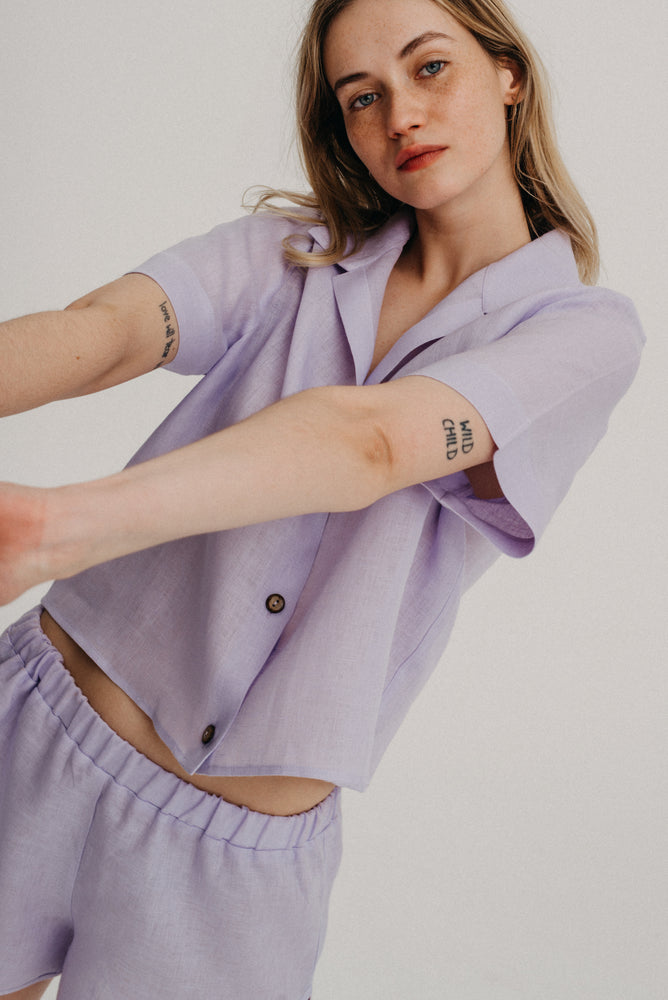
linen
linen
The breathable one
A textile that uses fibres obtained from flac stems. Linen is sometimes blended with wool or cotton.
Natural fabric, obtained from plant fiber
Fully biodegradable
Produced in Poland to shorten the supply chain
The flax plant is used in its entirety, flax seeds find use in the food & pharmaceutical industries
Durable
Antiseptic & anti-allergic
Breathable & moisture-wicking
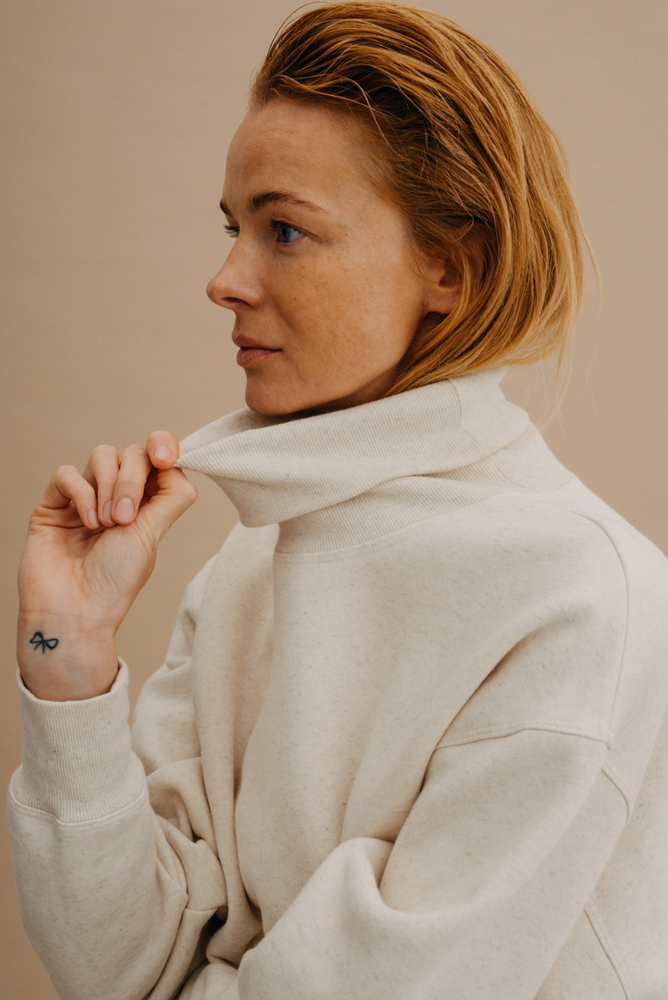
hemp
hemp
The most durable of fibres
Hemp is one of the world’s most durable fibres. Hemp textiles have been already used in ancient Egypt and Greece. Hemp fabrics are very delicate, and blend well with cotton, linen and silk.
Hemp is a natural fiber
Exceptionally durable, hemp clothing is made to last
Hemp requires considerably less irrigation to grow
With next to none natural enemies (insects) hemp does not require use of pesticides. It grows rapidly (up to 4 metres every few months), weeds stand no chance against hemp, which eliminates the need for herbicide use
Moisture-absorbent, dries very quickly
Anti-allergic fiber
Gentle on the skin – does not cause irritation
Cool in the summer, warm in the winter

Diagonal
Diagonal
No creases
Cotton textile characterized by a diagonal weave. Soft, breathable, crease- and wear-resistant.
Woven from organic cotton – production requires minimal amounts of water
Environmentally-friendly
Diagonal weave is soft & breathable
Very absorbent
Durable, made to last for years

ECONYL®
ECONYL®
The new lease of life for fishing nets
ECONYL® fibres are obtained from industrial waste, including fishing nets. ECONYL® is an eco-friendly, extremely elastic textile.
Econyl® is made from repurposed fishing nets, recycled bottles & packaging that may otherwise end up in our oceans
Produced according to the circular economy principles, which reduces its water consumption
Infinitely recyclable
Reduces the impact on global warming by 90% in comparison to nylon production
Good quality fabric
Exceptional elasticity and comfort – great swim and activewear performance
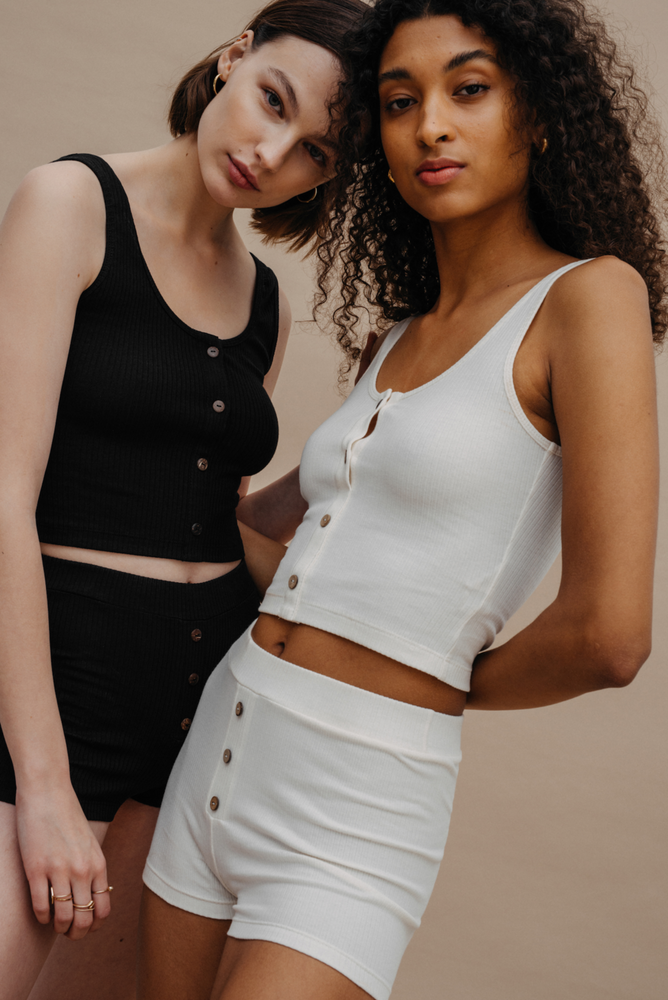
Organic cotton
Organic cotton
The responsible cotton
Organic cotton is obtained from green farming, and is free from harmful chemicals, including artificial fertilisers and plant protection chemicals. All substances used to promote plant growth & health are natural and include whey, citric acid, manure and extract.
Organic cotton uses 91% less water than conventional cotton
Hand-picked, hard-wearing and durable – the raw materials are not compromised by the use of chemicals or heavy machinery
Cotton fields can obtain organic certification after 3 years of activity, due to high soil purity standards
Does not cause allergies
Breathable, comfortable and gentle on the skin

Tencel™ (Lyocell)
Tencel™ (Lyocell)
The precious fibres
Tencel™ is made from dissolved wood cellulose. This natural textile is perfectly breathable, and its absorbent qualities prevent bacterial growth.
Sustainable production reduces energy and water consumption
Biodegraded
Fibres are obtained from renewable resources, certified as biodegradable and compostable
Supports the body's natural thermal regulating mechanism
Soft, silk-like feel
Durable
Absorbent
Breathable
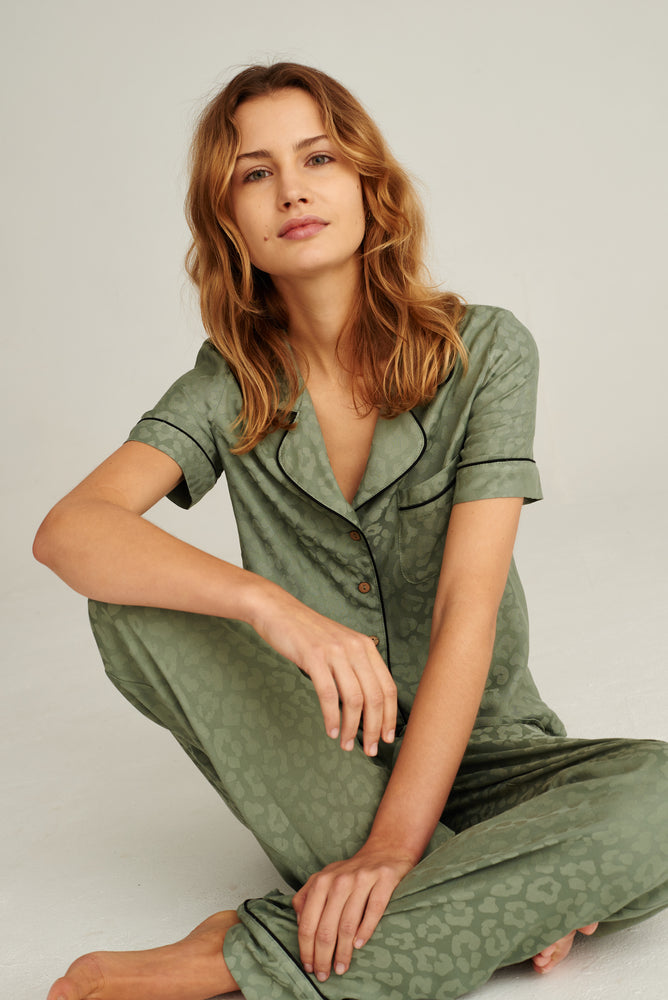
Ecovero™
Ecovero™
The natural viscose
EcoVero™ is a certified, high-grade viscose from cellulose fibres, derived from certified renewable wood sources, including beech, spruce and eucalyptus.
Sustainable production generates up to 50% lower emissions and water impact compared to generic viscose
Biodegradable
Fibres are derived from sustainable wood from certified sources
Absorbs moisture
Heat-resistant
Light
Pleasant to the touch

Cupro
Cupro
The vegan silk
Cupro is obtained from a renewable, natural source – cotton linter. Cupro has long been used to make linings, today it is used as a vegan silk alternative.
Biodegradable
Sourced from natural materials
Vegan
A product of circular economy
Regulates body temperature
Absorbent
Breathable

Recycled cashmere
Recycled cashmere
The second life of cashmere
Regenerated cashmere knits are spun into new yarn. Recycled cashmere reduces its environmental impact, giving used fabrics a new lease of life.
Made from repurposed fabrics – recycling reduces the water impact to zero
50% reduction of carbon footprint in comparison to virgin cashmere
Regulates body temperature
Maintains heat
Pleasant to the touch and comfortable

Micromodal
Micromodal
Combining the benefits of cotton and viscose
Micromodal combines the benefits of cotton and viscose – it’s a 2nd generation cellulose fibre derived from beech pulp. 95% of chemicals used in processing micromodal are recycled.
Sourced exclusively from certified beech forests
CO2 neutral – the production process is integrated with cellulose repurposing
Excellent moisture-wicking profile
Crease-resistant
Delicate, perfect for sensitive skin
Breathable
Durable, shrink-resistant
Anti-allergic

Primaloft Bio™
Primaloft Bio™
The recycled fabric
PrimaLoft Bio™ is a fabric composed entirely of biodegradable recycled synthetic fibres. Optimized to break down at a highly-accelerated rate.
Decomposes quickly
Biodegrades best in landfills and oceans
Naturally-occurring microbes break down the fibres, allowing them to return to natural elements
Extremely durable
Waterproof
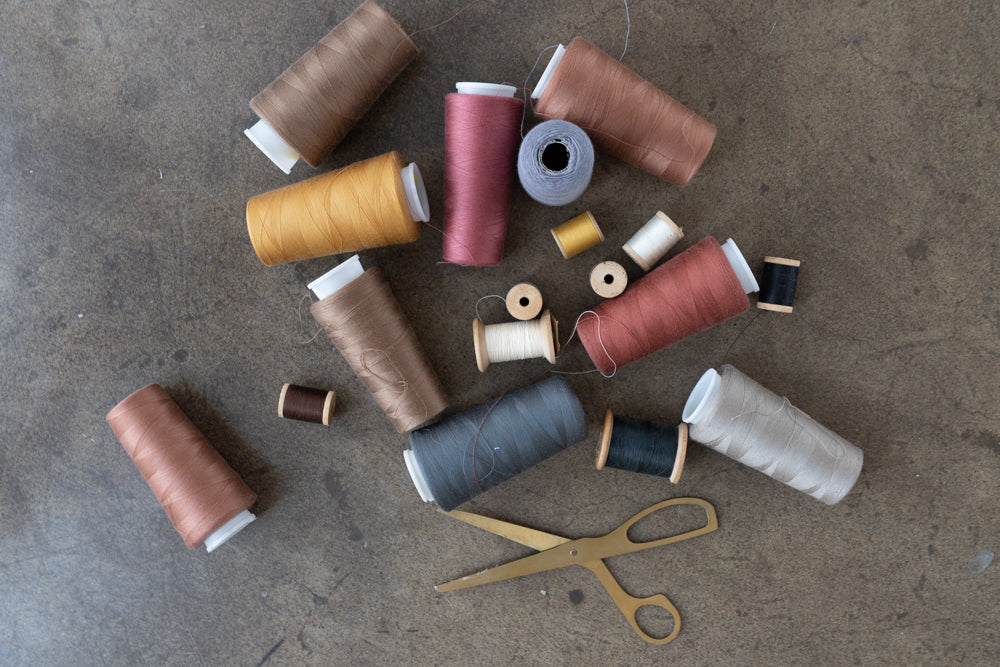
OTHER COMPONENTS
OTHER COMPONENTS
Anti-allergic, non-toxic, safe
Coconut shells - we use coconut shells to produce 100% biodegradable buttons
Recycled polyester - zip fasteners we use are made from polyester derived from recycled PET bottles. Mechanical recycling reduces water consumption by 86% and uses 70% less energy compared to traditional polyester production. We also find ways to avoid using any plastic components – we use linen strings and safety pins to attach our labels instead of plastic security seals commonly used by fashion brands
Paper - our labels are made using scrap paper. We have also refrained from printing our labels – instead, our logo is embossed
No nickel - we search for snap fasteners, buttons, hooks & eyes, sliders and zips made from nickel-free metals – nickel is a common allergen. Whenever a design does not require the use of flexible, light recycled polyester zips we use nickel-free metal fastenings made with organic cotton
Embroidery - all embroidery featured in our designs is done in viscose threads
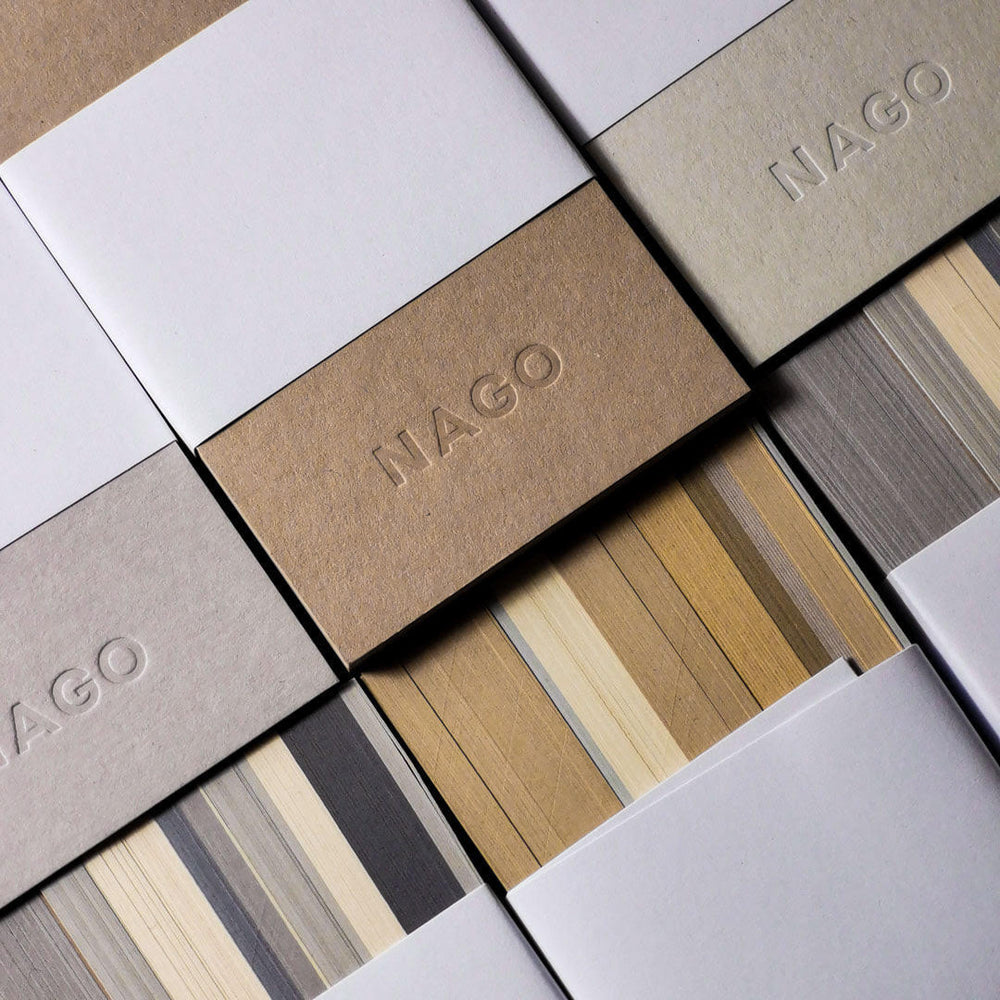
Labels and ephemera
Labels and ephemera
A hundred ways to zero waste
NAGO labels are made from scrap paper, cotton or recycled cardboard. We have also refrained from printing our labels – instead, our logo is embossed.
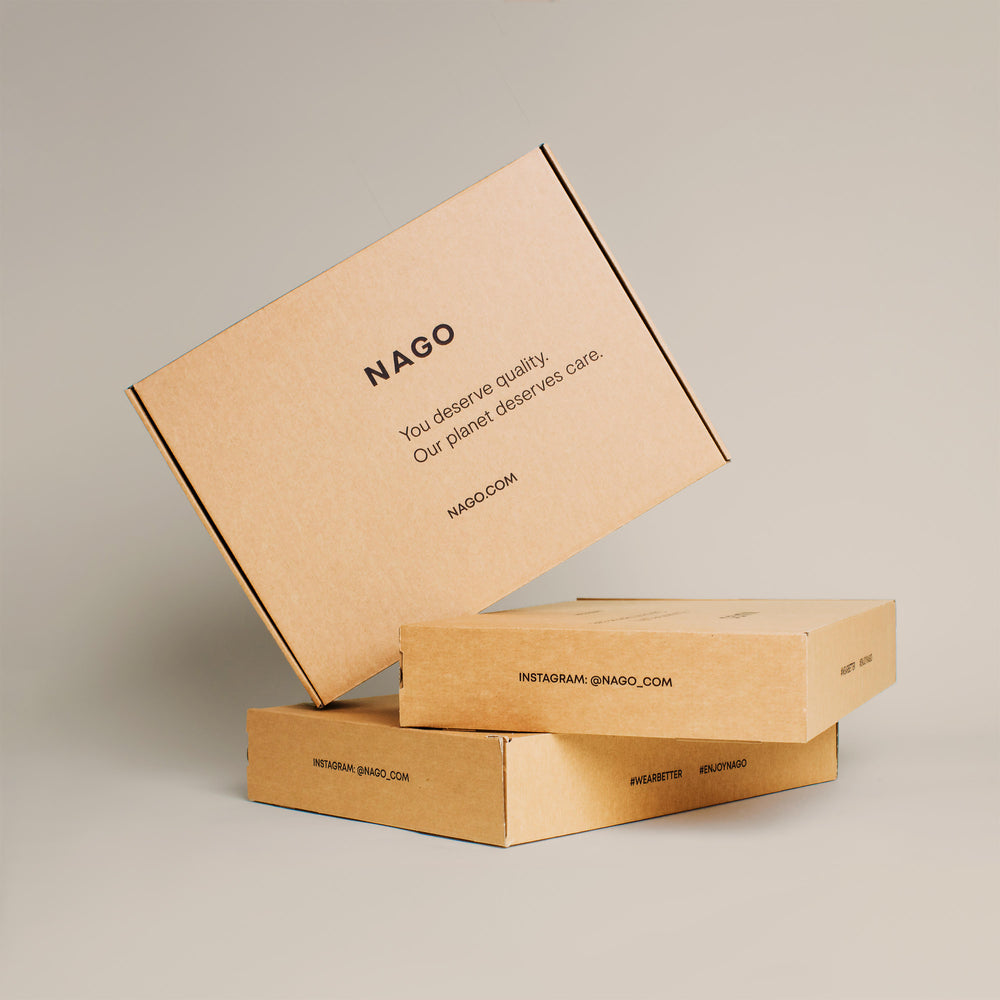
Packaging
Packaging
Simple form, clean process
We have adopted a zero single-use plastics policy
We have developed a tailored storage & delivery system – our clothes are transported and stored in reusable bags
Sewing factories and warehouses are located in close proximity
Our labels are made from scrap paper

Materials we don't use
None of the fabrics used in the production of NAGO garments and accessories are sourced from at the expense of forced labour, animal suffering or environmental harm caused by excessive water consumption, harmful chemicals or soil and ecosystem exploitation.
-
Synthetics: : polyester, polyamide, acrylic or elastane
At NAGO, we avoid using synthetic fabrics – polyester, polyamide, acrylic or elastane (except for up to 10% recycled polyester and elastane we add to some of our fabrics for added elasticity or durability) – mainly due to the fact these fabrics are non-recyclable. The washing of synthetic fabrics creates microplastic waste, which is released into waterways and atmosphere, causing harm to marine wildlife as well as humankind.
-
silk
Silk and non-certified wool products entail animal suffering. Silk is produced by boiling silkworms alive. Non-certified wool often comes from facilities where sheep are subjected to brutal treatment when sheared for wool – a process that leaves many wounded, injured and with broken limbs.
-
non-organic cotton
Our designs only use certified organic cotton. We take a stand against the use of conventional cotton in our collections, as its cultivation is the main cause of deforestation of the Amazon and other forests around the globe. One kilogram of conventional cotton requires 29000 litres of water. The annual global production of conventional cotton equals 27 million tonnes. It takes 2700 litres of water to produce one t-shirt made from conventional cotton, which is what an average person would drink in 2,5 years. Apart from the water, that one t-shirt requires the use of around 8000 harmful chemical substances.
-
non-certified wool
95% of our products are vegan. The remaining 5% are created using cruelty free certified wools.
-
leather
We also reject the use of leather – we oppose animal suffering as well as hazardous working conditions at tanneries and the excessive CO2 emissions.


Since the beginning of our existence, NAGO has been registered at an international database of fur free brands, as well as the Polish equivalent organization, initiated by the animal welfare association Otwarte Klatki. We are a member of a global program launched by 50 leading animal welfare and environment protection organizations: https://furfreeretailer.com/.

How do we know our products are environ-friendly

All NAGO textiles & raw materials are certified by relevant organizations accredited to confirm compliance with certain environmental criteria. We carefully consider our choice of subcontractors – textile producers, manufacturers, production plants and warehouses. We make sure all our associates all hold environmental certificates to ensure the best environmental fashion standards throughout.
Oeko-Tex
Certification awarded to products free of substances known to be harmful to our health: dyes, formaldehyde, nickel, chromium, lead or allergens. Awarded to end products only.
GOTS
Certification system based on the key norms of the International Labour Organisation, awarded to textiles composed of a minimum of 95% organic fibres in case of the organic grade or 70% organic fibres in case of the made with organic materials label. The criteria include compliance with ecological farming principles (free of GMOs), and environmentally sound practices throughout the supply chain. GOTS certification is extremely difficult to obtain, and is never awarded to leather goods. Certification is valid for a year and has to be repeated annually. GOTS standards guarantee the textiles and goods are manufactured according to best labour and ecological condition standards.
LENZING
The Lenzing Group produces LENZING™ tencel and modal. Both textiles are produced in a sustainable, environmentally-responsible way. The LENZING™ certificate guarantees quality, eco-friendly fibres that are biodegradable and compostable under household, industrial, marine and soil conditions. All wood used in production comes from certified, controlled sources.
GLOBAL RECYCLED STANDARD
Certifies products obtained from recycled materials. Awarded to products containing at least 20% of recycled materials, or the minimum of 50% recycled content in case of products carrying the GRS logo. The certification process verifies a product’s entire supply chain – any final product sold as GRS certified complies with relevant policies and standards at every stage of production – from raw materials, through processing through to distribution of the final product. The certification standards include:
- tracking and and identifying recycled materials across the supply chain
- environmental criteria
- social criteria
- reduced use of chemical substances
RWS
The Responsible Wool Standard certification relates to wool, the welfare of the sheep and the land on which they graze. RWS ensures that the wool comes from farms with a progressive approach to land management, not harmful to animals and respecting the List of Five Freedoms. The RWS title is awarded only to products made of 100% certified wool.

Why we uncover the naked truth
NAGO stands for price transparency and conscious consumption. What determines the final price of a product? Many factors contribute to the price, here are some of them.
Product development
sample creation is a process that requires meticulous care. From the design, working out the construction of the garment, sewing prototypes, sizing, alterations, through to creating the final samples.
Textiles and accessories
sourcing & purchase of sustainable, eco-friendly fabrics and accessories, which constitute the large proportion of the final price. The solutions we put to practice are often more constant than standard equivalents. Transport of raw materials and accessories also contributes to these costs.
Sewing in Poland
and fair pay. All our products are made in Poland. We collaborate only with manufacturers who comply with equitable pay principles.
Research & development
the cost of innovative solutions in fabric and accessory, label & packaging design and testing their functionality (e.g. cactus leather alternative).
Transport & packaging
costs related to warehouse staff employment, purchasing and storage of packaging, transportation.
Taxes
we pay taxes where we work and make our clothes – in Poland. We operate responsibly and legally.
Corporate social responsibility
At NAGO we consider public interest, environmental issues, we embrace our social responsibility and nurture sustainable social & economic development.
Fixed costs & profit margins
the costs of running the business and its development, including employment costs, office and store rent and maintenance and the company profit.

How we put our values into practice
Basing our brand philosophy on the principles of sustainability, accountability and openness, supporting social initiatives is at the heart of NAGO activities. By investing in these causes we want to raise awareness amongst our greatest friends - our customers.
Supporting woman
In autumn of 2020, as a sign of solidarity with women protesting against further restrictions in the abortion law, we released a t-shirt featuring the red lightning bolt – the symbol of the protests. All profits made from sales of the tees were donated to Ogólnopolski Strajk Kobiet.
Saving the young persons’ helpline
We donated 40 PLN from every purchase made between May 30th and June 1st 2020 to a children & young persons’ helpline. Every 40 PLN covered the costs of ca. 4 phone calls. This is a particularly significant initiative, devoted to supporting mental health in children and young persons and fighting domestic violence. The phone service has been crucial in providing help to those in need.
Fighting menstrual poverty

Menstrual poverty is a global issue affecting the lives of many women and girls who have no access to safe sanitary products. As fabrics we use meet the highest safety & quality standards, we offered offcuts and samples to Sewing Together – a charity organization that for the past 3 years has supported women in Africa on their path to economic independence. Reusable sanitary pads made in Mombasa are delivered to girls in nearby villages so they can attend school freely.
Nurturing positive self-esteem in young girls
Polish girls lead the European polls for lowest self-esteem, and it is self-confidence that directly influences the ability to reach one’s full potential. In March 2021, to celebrate International Women’s Day and the launch of the our new underwear collection, we donated 10% of all underwear proceeds to support the activities of Fundacja Kosmos dla Dziewczynek – an organization whose mission includes promoting and reinforcing body positive language and culture amongst young girls, fighting anxiety related to body image and the preoccupation with appearance.
Helping the senior citizens
We donated 50 PLN from every order made between April 7th and 13th 2020 to an Easter holidays fundraiser organized by Stowarzyszenie Mali Bracia Ubogich (one of the leading Polish charities supporting the elderly) to help those in need celebrate the holiday in a pandemic-struck reality.
Why are they worth knowing?
-
fair trade
One of the prerequisites for obtaining certification. For decades, the fashion industry has maintained exploitative practices. Equitable, timely pay should now become a crucial standard.
-
GREENWASHING
False claims of sustainability aimed at misleading consumers, focused on nothing but profit. Companies engaging in greenwashing may orchestrate one-off campaigns focused on environmental issues or use green labels for fabrics containing polyesters. All NAGO activities are honest and transparent. We operate according to the principles of sustainable development, and all of the fabrics we use to make our garments and accessories carry relevant certificates and are fully recyclable.
-
LESS WASTE
Sorting waste, clearing out our wardrobes, switching to reusable shopping bags, reducing household plastics – there are so many little steps we can take to help our planet.
-
component LABELS
One of the fundamental skills in consciously navigating the world of fashion is the ability to decipher a label. A “green” label does not necessarily represent an eco-friendly product. It really is worth checking the label to determine what percentage of a fabric is composed of organic cotton or tencel. It is enough for a fabric to contain over 5% of polyester to make it non-recyclable. It is also worth knowing what constitutes an eco-friendly fabric. For example, it takes around 8000 various harmful chemical substances to treat conventional cotton used for making t-shirts. Washing & care instructions are also worth paying attention to – observe the directions to extend the lifespan of your jacket, trousers or shirt.
-
OVERPRODUCTION
Each year we discard 92 million tonnes of clothing – every single second a truck-full of clothes empties into a skip somewhere around the globe, while international clothing conglomerates burn hundreds of tonnes or unsold goods. Only 1% of global clothes production is recyclable. Shamefully, fashion ranks as one of the most environmentally harmful industries.
-
WASHING
The microfibres of synthetic textiles (mainly polyester and nylon) released during washing, pass into our waterways, contaminating rivers, seas and oceans. As much as one third of the oceans’ plastics is composed of microfibers slipping through our washing machine filters. Once ingested by marine animals, they make their way up the food chain into human organisms.
-
THE 3R PRINCIPLE
Reduce, Reuse, Recycle. The three commandments for the environmentally-minded.
-
SUSTAINABLE FASHION
Sustainable fashion is environmentally-minded, it’s fashion that benefits not only the customers and ecosystems, but also turns to the producers’ advantage in the long term. Every stage is vital in a sustainable production process: starting from the choice of sustainable, natural fabrics, through minimizing water consumption, securing adequate working conditions, to reducing post-production waste and supporting local businesses. NAGO has operated according to sustainable fashion principles from the very beginning.
-
SUSTAINABLE DEVELOPMENT
The framework embraces a simultaneous commitment to the environment, economic growth and welfare. Today, the principles of sustainable development constitute the biggest challenge to fashion brands – the ultimate aim is to combat widespread current practices, including destroying unused and unsold goods in industrial burners, excessive textile production carbon footprint, nearly unlimited water consumption, contamination of waterways with toxic dyes, all result from excess production, price wars and fast fashion (increasing the number of seasonal drops in a bid to respond to current trends.)